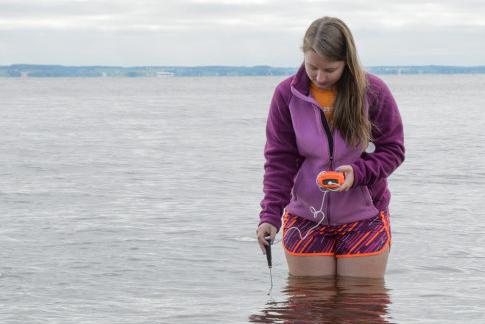Recreational Water Testing
Our state-certified laboratory can perform a variety of research focusing on rapid molecular testing and microbial source tracking. The lab analysis equipment and methods are the most up-to-date and rapid as approved by regulatory agencies.
Samples are often processed on the same day they are received, which means quicker results for the client and the ability to tackle even the most time-sensitive sampling projects.

UW Oshkosh has been leading Wisconsin’s Great Lakes beach monitoring program since 2003. Now housed at the Environmental Research and Innovation Center (ERIC), the program monitors approximately 120 beaches along Lake Michigan and Lake Superior covering nearly 600 miles of total coastline.
Every summer, ERIC places student interns at four related state-certified labs to assist in monitoring these beaches.
These internships provide great hands-on laboratory and field experience for the workforce of tomorrow, while offering an efficient and capable workforce today.
ERIC is also lending its recreational water research expertise to the Great Lakes Restoration Initiative (GLRI) and Environmental Protection Agency (EPA) by conducting sanitary surveys of several Great Lakes beaches to evaluate possible sources of fecal pollution.
With rapid molecular testing (qPCR) equipment at its disposal, the ERIC provides the fastest possible detection and notification of hazardous levels of bacteria in recreational water.
Rapid Molecular Testing (qPCR)
With funding assistance from the Great Lakes Restoration Initiative (GLRI) and Environmental Protection Agency (EPA), ERIC has recently acquired rapid molecular testing equipment (qPCR) to aid in its recreational water services.
This particular equipment is able to analyze DNA from bacteria within four hours of collecting water samples, providing the promptest notification and public awareness possible when hazardous bacteria levels are found.
Sanitary Survey Project
In 2010, UW Oshkosh’s ERIC was awarded significant funding by the Great Lakes Restoration Initiative and EPA to conduct surveys at several recreational beaches to evaluate potential sources of fecal pollution.
ERIC, in collaboration with several other agencies, is conducting these surveys at a total of 35 beaches bordering Lake Michigan and Lake Superior.
The overarching goal of this project is to accurately characterize the sources of microbial pollution that may impact water quality for a large number of beaches on the shorelines of Lakes Michigan and Superior.
Specifically, this project will provide a basis for each of the communities partnering in this study to begin to develop recommendations on mitigating microbial contamination at these Great Lakes coastal beaches.
Resources
- A Guide to Conducting Beach Sanitary Surveys in Wisconsin
- Beach Models: Predicting Water Quality
- Healthier Beaches: Using Sanitary Surveys to Mitigate Pollution
- Comprehensive Beach Sanitary Survey Project
- EPA’s Beaches Environmental Assessment and Coastal Health (BEACH) Program
- Wisconsin DNR’s Beach Monitoring Program
- Great Lakes Restoration Initiative (GLRI)
- Bay-Lake Regional Planning Commission: GLRI Beaches Project
UNIVERSITY OF WISCONSIN OSHKOSH
Environmental Research and Innovation Center
(920) 424-3148
eric@uwosh.edu783 Pearl Avenue
Oshkosh, WI 54901
Hours
Monday-Friday 8 a.m. – 4 p.m.
Samples Accepted
Monday-Thursday 8 a.m. – 3 p.m.
Mailing Address
UW Oshkosh ERIC
800 Algoma Blvd.
Oshkosh, WI 54901

